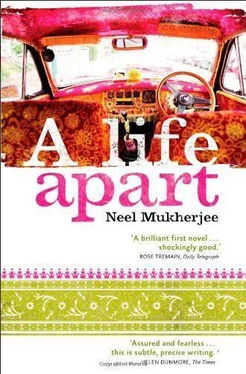As if the release of orgasm has freed his attention on to other things, Ritwik suddenly notices the deeper darkening inside the car and wheels his head in panic. The windows are opaque, they are no longer clear glass between inside and outside. There are bodies and faces outside, looking in. His heart thuds in his throat in slow motion; he has no idea how many seconds or minutes elapse before they both realize the shapes outside are not humans.
‘Horses,’ the man says.
‘What?’ Ritwik’s voice is a blur.
‘Horses. The trucks you see, they carry horses. They’ve stopped here for the night and let them out on to the meadow. They’ll carry on tomorrow morning.’
It takes some time for this to sink in. The animals on all sides are peering in, their noses and muzzle so close that he strains to catch another shade of the dark in a horse’s eye looking in through the passenger window. Their snuffling breath has condensed here and there and trickles down as threads of water. The last residue of panic still courses around in him somewhere. He looks ahead, out of the windscreen, and there, in the clotted blackness outside, notices a shuffling dance of firelight, as if a dozen will o’ the wisps have suddenly erupted from nowhere. His mind isn’t quite working, he can’t understand these suspended points of fireflicker swimming about. The man almost senses his confusion. He lets out a little laugh, ‘See, they’ve come out of their trailers now to take them in. They’re looking for the horses.’
As if on cue, the silence shivers only a tiny fraction to let a few high up-and-down calls from the searchers escape, then it gathers back again over those truncated shepherds’ notes as if they’d never been. The shapes outside the car begin to move.
‘We should go,’ the man says.
Ritwik nods, unable to speak, but his fear and tension have disappeared. He feels a sense of release, an achievement almost. The man is trying to be affectionate by putting his arms around him and trying to kiss him, again, but only manages an awkward parody of it. He is also muttering some fearful slush in his ears while stroking his hair, ‘You’re Hassan, my prince, my lovely prince Hassan. .’ Ritwik curls his toes. He starts stroking the man’s face to prepare him for his next move: ‘Could you please drop me off somewhere in town. . perhaps where you picked me up?’
‘Yes, yes, of course,’ says the stranger and then lapses into his fantasy again: ‘You’re an Arab prince, your name is Hassan—’
‘No, I’m not.’ His words cut in like the lash of a whip. The man removes his hand as if he’s been struck. Ritwik regrets instantly, ‘Look, it’s getting late. .’
‘Oh, yes, yes.’ He turns on the ignition and cuts out the headlights the second they come on. The revving car is too loud. The horses can’t be seen anymore. The searching lanterns seem to have disappeared as well.
It’s late when he’s dropped off at the corner of Broad Street and Cornmarket Street. It has started drizzling gently; under the sodium vapour lamps it looks like a sad sequin shower without the celebratory glitter. He feels light, not quite happy, but getting there, getting there. While trying to put on his Thinsulate branded gloves, he notices black stains on his palms. He tries to figure out what they can be; they come off when he rubs them hard, and when he sniffs his hand, there is a familiar chemical tang he tries to identify. . shoe-polish, that’s it, black shoe-wax. He doesn’t know why he instantly thinks that the man had dyed his moustache with it.
He sneaks back into college, almost tip-toeing to his room. He doesn’t want to be seen, or talked to, and then smiles wryly: there’s hardly anyone to notice him or talk to him apart from Gavin and he knows Gavin is working late at his studio tonight. He feels both lonely and the utter banality of this loneliness at the same time. Maybe he’ll tell himself a story, the story of that blue-clad Englishwoman from a film so ablaze with reds and russets and oranges and flame that she had stood out like its principle of meaning, holding out the slender hope that she was going to shore up all the dispersal and disintegration around her. He has no idea why the film, Ghare Bairey , has suddenly come unbidden to his mind, a film he had seen nearly ten years ago in Calcutta, but that fleeting woman, Miss Gilby, who had passed through its frames for all of three minutes, or less, all blue primness and measured politeness, will simply not leave his head. She was so marginal, her presence so brief, vanishing almost before her story began. What if he told her story, which hadn’t been written down or filmed?
Before he enters his room he goes to the bathroom, scrubs clean his hands, his cock, his mouth and face at the sink. Quietly, very quietly, so that Zoe and Charlotte, in the adjoining rooms, don’t suspect anything. He enters his room, drowning out any surfacing fear of his mother sitting inside and quickly turns on the light. He sits down and writes.
The rains have started early this season. Very soon, the Maidan is going to become a shallow lake, and Free School Street, Eliot Street, all muddy little streams and rivulets. Miss Gilby knows that the rains are going to bring with them ants, termites, cockroaches, a hundred other unnamed creeping and crawling creatures, and the incessant croaking of toads and frogs all night long in the puddles and ponds which accumulate everywhere during the monsoon. They talk to each other all night, an amphibian parody of antiphon and response, and it drills into Miss Gilby’s head with its monotonous regularity. Besides, she hates those ugly creatures. During the entire rainy season, there are scores of them in the front courtyard, sometimes even at the bottom of the stairs leading to her rooms. She had stepped on one of these inadvertently once. The experience still sends shudders down Miss Gilby’s spine: first of all, she hadn’t expected the creature to turn upside down, exposing its disgusting smooth white underneath, and then, before she had had time to step off it in horror, she discovered the resiliently springy texture of the animal, as if it were a large jujube or jelly. She was grateful the toad didn’t go ‘splat’ and explode under her shoe but it disturbed her no end that no sooner had she moved her foot than it hopped off, springing to life, the weight of Miss Gilby just a minor pressure on its innards of sponge. Ugh!
If Mahesh gets more intransigent this season, Miss Gilby is going to discharge him from his duties. Not a single week passes when she doesn’t have to chide him for carelessness or sheer forgetfulness. He still hasn’t managed to ask the builder to come and look at the various leaks, one right in the ceiling of the drawing room, which dripped water down on to her floor, inches away from her Steinway. He had put pails and buckets to catch the drips but mostly in the wrong places so that the damage had already begun. When she had taken him to task for it, he had grovelled first and then dared to answer back — how was he to know where the leaks were if they didn’t start dripping in the first place. Unconscionable impudence. As if she hadn’t spent all of last Rainy Season pointing out the leaks to him over and over again.
She will ask him to get the chairs from the verandah, especially her favourite planter’s long sleever, a present from James, in to the drawing room, remove all the cane chairs and tables, and let down the rattan shades so that the rains don’t flood her verandah every day. And then there will be the fraught business of packing up, storage, removal and relocation.
Mr Roy Chowdhury had kindly offered to come down to Calcutta in his motorcar and drive her to Nawabgunj, which, of course, will save her a long, bone-rattling journey, for at least part of the way on a palkee . But some of her possessions are going to have to go by train and then by God knows what, in all probability a bullock cart; she is sure most of them are never going to arrive in one piece, jolted and shaken as they are certainly going to be on the atrocious Indian roads and the mud and kunkur tracks. The very thought makes her feel weak so she sits down and starts making lists. There is great comfort to be derived from lists: they organize life, bring order and method, cut the amorphous business of a messy life into manageable and sizeable chunks.
Читать дальше












